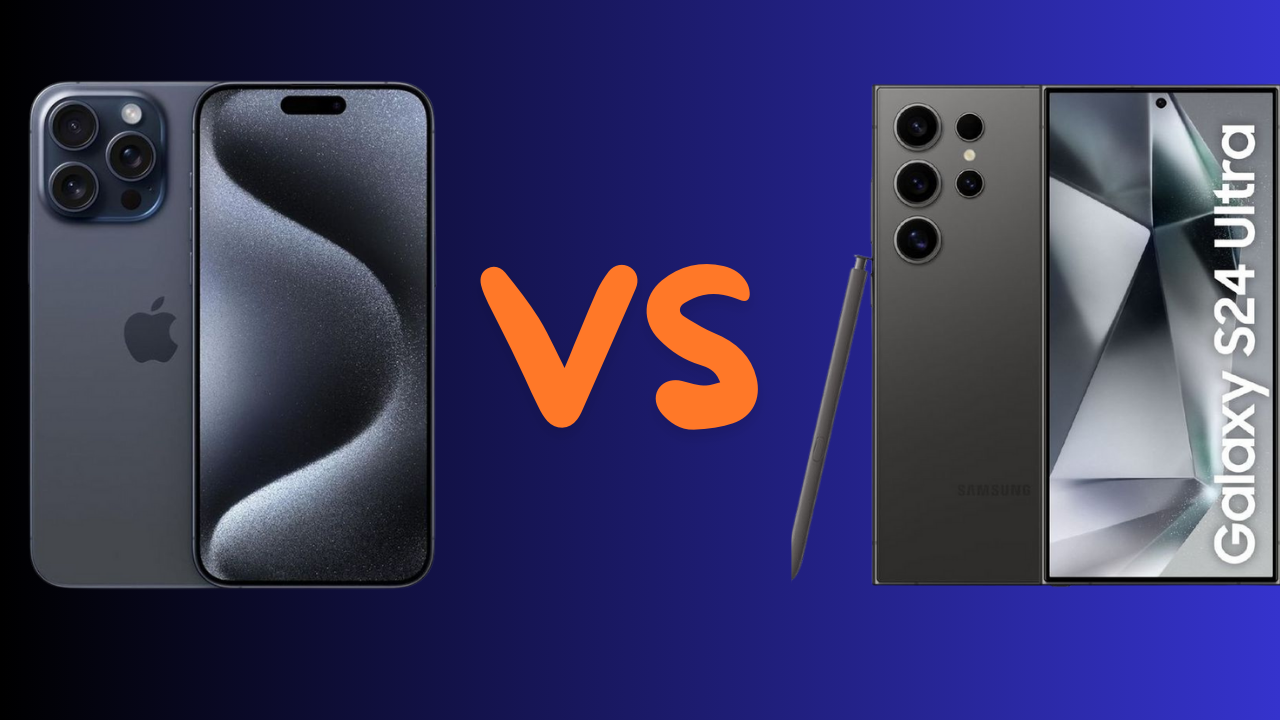
Samsung Galaxy S24 Ultra vs iPhone 16 Pro Max
The Samsung Galaxy S24 Ultra and iPhone 16 Pro Max are two of the most anticipated flagship smartphones of 2024, representing the pinnacle of mobile innovation from Samsung and Apple. These devices showcase cutting-edge technology, each boasting unique features that cater to different user preferences. Let’s dive into an in-depth comparison of these two giants. 
Design and Build
-
Samsung Galaxy S24 Ultra continues Samsung's tradition of sleek, futuristic designs with sharp edges, minimal bezels, and a more refined Dynamic AMOLED 2X display. It also comes with the signature built-in S-Pen, making it a go-to for creatives and professionals alike.
-
iPhone 16 Pro Max sticks to Apple's iconic design philosophy. It maintains the flat edges introduced with earlier models and includes a Ceramic Shield for added durability, with a slightly smaller notch thanks to the under-display Face ID system.
Display
-
The S24 Ultra features a massive 6.8-inch Dynamic AMOLED 2X display with an impressive 3200 x 1440 resolution and a 120Hz refresh rate. Its display offers superior brightness, vividness, and detail.
-
The iPhone 16 Pro Max, with its 6.7-inch Super Retina XDR OLED display, has a slightly lower resolution but delivers Apple's characteristic color accuracy and crispness. It also features ProMotion technology for a 120Hz refresh rate but may not match Samsung’s peak brightness levels.

Camera
-
The Galaxy S24 Ultra is a beast in terms of photography, equipped with a 200MP primary sensor, a 12MP ultrawide lens, and two 10MP telephoto lenses (3x and 10x optical zoom). Samsung's focus on AI-driven photography further enhances low-light shots, zoomed-in details, and video stabilization.
-
The iPhone 16 Pro Max has made strides with its 48MP primary camera, 12MP ultrawide, and 12MP telephoto with 5x optical zoom. Apple's Photonic Engine and improved AI for image processing ensure incredible detail, dynamic range, and color accuracy.
Performance
-
Samsung S24 Ultra houses the Exynos 2400 (international markets) or the Qualcomm Snapdragon 8 Gen 3 (US), delivering a leap in AI performance, gaming capabilities, and power efficiency.
-
iPhone 16 Pro Max is powered by Apple's latest A18 Bionic chip, renowned for its raw performance, optimized power usage, and machine learning capabilities. iOS’s tight integration with hardware provides smooth multitasking and an efficient user experience.
Battery Life and Charging
-
The S24 Ultra comes with a 5000mAh battery and supports 65W wired charging and 15W wireless charging. Samsung’s superior battery management system ensures all-day performance, even with heavy usage.
-
The iPhone 16 Pro Max, while slightly behind in battery capacity with a 4500mAh battery, supports 30W wired charging and 15W MagSafe wireless charging. Apple's battery optimization in iOS ensures impressive battery life despite the smaller size.
Software and Ecosystem
-
Samsung S24 Ultra runs on Android 14 with One UI 6.0, offering deep customization and multitasking options. Samsung's DeX feature provides a desktop-like experience when connected to an external display, giving it an edge for productivity-focused users.
-
iPhone 16 Pro Max runs on iOS 18, known for its seamless ecosystem, security, and regular software updates. Apple's ecosystem integration with devices like the MacBook, Apple Watch, and iPad makes switching between devices a breeze.
Price
-
Samsung Galaxy S24 Ultra starts at $1,199, making it slightly more affordable compared to the iPhone.
-
iPhone 16 Pro Max starts at $1,299. Though priced higher, the resale value of iPhones typically remains stronger over time.
Samsung Galaxy S24 Ultra vs iPhone 16 Pro Max: Comparison Table
| Feature | Samsung Galaxy S24 Ultra | iPhone 16 Pro Max |
|---|---|---|
| Display | 6.8-inch Dynamic AMOLED 2X | 6.7-inch Super Retina XDR |
| Resolution | 3200 x 1440 | 2796 x 1290 |
| Refresh Rate | 120Hz | 120Hz |
| Main Camera | 200MP | 48MP |
| Telephoto | 10MP (3x and 10x Optical) | 12MP (5x Optical) |
| Chipset | Exynos 2400 / Snapdragon 8 Gen 3 | A18 Bionic |
| RAM | 12GB/16GB | 8GB |
| Battery | 5000mAh | 4500mAh |
| Charging Speed | 65W wired, 15W wireless | 30W wired, 15W MagSafe |
| Operating System | Android 14 (One UI 6.0) | iOS 18 |
| Starting Price | $1,199 | $1,299 |
How Samsung is 10 Years Ahead of Apple
Samsung has consistently pushed the boundaries of technology in ways that sometimes make it feel like they are a decade ahead of Apple. Here’s how:
-
Display Technology: Samsung has long been the industry leader in display technology. Their AMOLED screens have been the standard for high brightness, vivid colors, and energy efficiency. Apple still relies on Samsung for OLED displays and only recently integrated high refresh rates.
-
Foldable Tech: Samsung pioneered foldable smartphones with the Galaxy Z Fold and Flip series, an area where Apple has yet to make a debut. The Z series feels like a peek into the future of smartphones.
-
S-Pen Integration: Samsung’s S-Pen is a versatile tool that has been improving since the Galaxy Note series. The iPhone has yet to introduce a stylus as seamless and integrated as Samsung’s.
-
Camera Innovation: Samsung has been consistently pushing zoom capabilities, leading with their 100x Space Zoom, while Apple is only now introducing a 5x telephoto lens.
-
Multitasking and DeX Mode: Samsung’s DeX, which allows phones to turn into desktop-like computers when connected to a monitor, is a game-changing productivity tool. Apple’s iPhones don't have anything comparable.
-
Customization and Software Flexibility: Android, particularly with Samsung's One UI, offers significantly more customization and flexibility than iOS. Apple's ecosystem, while polished, can feel restrictive compared to the freedom offered by Android devices.
-
Battery and Charging Tech: Samsung leads the way with faster charging speeds, with 65W in the S24 Ultra compared to Apple's 30W. Samsung also offers better battery life management with higher capacity batteries.
-
Foldable Laptops and Rollable Devices: Samsung is developing futuristic tech like foldable laptops and rollable displays, innovations where Apple is yet to make a mark.
-
MicroLED Technology: Samsung is pushing ahead with MicroLED, which offers better efficiency and even higher quality visuals than OLED. Apple is rumored to be working on this, but Samsung is already leading in this space.
-
5G and Network Technology: Samsung was ahead of Apple in 5G adoption, and it continues to lead in offering faster and more efficient mobile connectivity solutions.
Frequently Asked Questions (FAQs)
Q: Which phone has a better camera, the Samsung Galaxy S24 Ultra or the iPhone 16 Pro Max?
A: The Samsung Galaxy S24 Ultra leads with its 200MP primary camera, offering superior zoom and more detail in various lighting conditions. The iPhone 16 Pro Max, while excellent with its 48MP camera, focuses more on color accuracy and consistency.
Q: Does the Samsung Galaxy S24 Ultra have better battery life than the iPhone 16 Pro Max?
A: Yes, the Galaxy S24 Ultra has a larger 5000mAh battery and supports faster charging at 65W, giving it a slight edge over the iPhone 16 Pro Max's 4500mAh battery and 30W charging.
Q: Which phone is better for productivity, Samsung Galaxy S24 Ultra or iPhone 16 Pro Max?
A: For productivity, the Galaxy S24 Ultra stands out with its S-Pen, Samsung DeX mode, and multitasking capabilities. The iPhone 16 Pro Max is excellent within the Apple ecosystem but lacks the versatility Samsung offers.
Conclusion
Both the Samsung Galaxy S24 Ultra and the iPhone 16 Pro Max are top-tier smartphones, offering fantastic performance, cameras, and design. The choice between them often comes down to personal preference: Samsung leads in terms of hardware innovation, flexibility, and cutting-edge features, while Apple excels in software integration and ecosystem coherence. For those who want a glimpse of the future, Samsung is undeniably ahead, pushing the boundaries of what smartphones can do.
